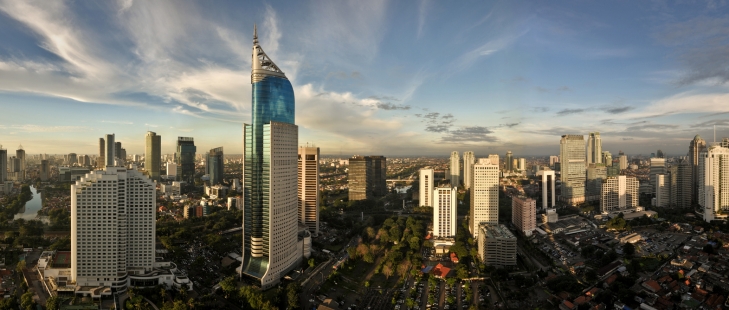
Business families of Southeast Asia’s largest economy look ahead to building for future success and generations
When Christina Suriadjaja graduated from the University of Southern California in 2014 with a Bachelor’s degree in Business Administration and Entrepreneurship, she returned home to Indonesia where she did pro bono consulting with the Ministry of Tourism. While there, she came across data that pointed to a startup idea.
“There was a lot of housing backlog,” says the founder of Travelio.com, an accommodation sharing platform. “There was about 50 million people in the middle class who could not afford to buy housing. In Jakarta, there were about 300,000 vacant apartments, most of them were left empty.
“These apartment owners are upper middle-class to upper class, while the middle class struggled to buy housing. My passion started from there trying to bridge this socioeconomic gap in terms of housing and education, to empower the middle class to be able to afford housing and for the middle upper class to gain a stabilised rental yield for the property investments they’ve made.”
It helped that she had seed funding from her family, which owns PT Surya Semesta Internusa, an Indonesia Stock Exchange-listed construction company with revenues of about US$257 million for the latest financial year. Despite his father, PT Surya Semesta Internusa President Johannes Suriadjaja’s doubts about working with his own daughter, the 28-year-old has grown Travelio to 220-strong after recently closing its Series B funding.
Growing with technology
Family business and property were dominant themes at the recent SMU event, “Spotlight Indonesia – Visions & Opportunities”. Alvin Gozali, President Director of property developer PT. Putragaya Wahana, was part of a panel with Suriadjaja. Having completed the building of the UOB Plaza in Jakarta in 2006 following the death of his father and company founder, Gozali describes himself as “Gen 1.5”.
According to him, Jakarta has similar characteristics to 1940’s New York City and offers similar potential for development and profit.
“We’re approaching New York in the 1940’s [in terms of density] and we’re envisioning ourselves building the Empire State Building,” says Gozali, who is currently working on Thamrin Nine whose Tower 1 is slated to be Indonesia’s tallest building at 334 metres when it is completed in 2020. “We want to change the mindset of a lot of the people like Petronas [did for Malaysia] on a smaller scale, to make a statement that Jakarta is the next city coming up.”
Gozali points out Jakarta’s GDP (PPP) of about US$45,000 as being conducive to the introduction of technology, an assessment that is reflected by the growth of Indonesia’s four unicorns: Go-Jek (ride-hailing), Traveloka (flight and hotel booking), Tokopedia, and Bukalapak (both e-commerce).
“For technology to work right, you need scale,” he elaborates. “Jakarta has the scale and Singapore has the management capability. Singapore and Indonesia are polar opposites and they match really well. Opposites do attract.”
“Of the four unicorns in Indonesia, we have either succeeded in securing their data science technology teams in Singapore or they will be doing soon,” says Beh Swan Gin, Chairman of the Singapore Economic Development Board (EDB) who was also on the panel. He adds:
“In the EDB we have a dedicated family business unit. We looked at the dynamism of the family businesses, not just in Indonesia but across Southeast Asia, and they will be a dominant force in the regional and global economy going forward. We are constantly looking at ‘How else can Singapore play a role?’ Access to capital. Access to talent. Those are obvious. A new growth area is in family offices, so that’s another area.”
Giving back, LOOKING AHEAD
With Joko Widodo winning another term as president, those on the panel are hopeful that Indonesia can build on its newfound status as a trillion-dollar economy. But on matters of developing their own family businesses, the focus is firmly on sustainable growth and giving back to society.
“I’ve always admired a lot of the old European companies that have lasted for multiple generations,” says Jonathan Tahir, Deputy Chairman of Mayapada Group, a diversified conglomerate with interests in retail, healthcare, and property. “It’s always been a dream: How do I make our family business last that long?
“I’m a big believer in how to make our business more sustainable, relevant, and having good corporate governance. For me, I’m a believer that for our next generation, it doesn’t have to be family. I think for the company to be sustainable, it has to hire the best person for the job.”
“On giving back,” he adds, “I think it’s important for companies to make sure it’s not a fad or a one-off thing. Regardless of whether business is good or bad, you must have a commitment to give back. It’s a matter of commitment. We must also must sure the funds that have been distributed are used well.”
“I agree with Jonathan,” Gozali chimes in. “I really don’t want to give handouts – that’s the worst thing to do. We really have to educate our people. I’ve noticed that Indonesia’s English literacy rate is going up. Right now the literacy rate is about 98 percent, and secondary school graduation is above 80 percent.
“We really have to keep on educating our people, whether it’s people in our businesses, their family etc. We sponsor a lot of education programmes for our staff. We hope to sponsor a lot more, maybe do tie-ups with EDB to do more.”
Follow us on Twitter (@sgsmuperspectiv) or like us on Facebook (https://www.facebook.com/PerspectivesAtSMU)
Last updated on 28 Jun 2019 .

